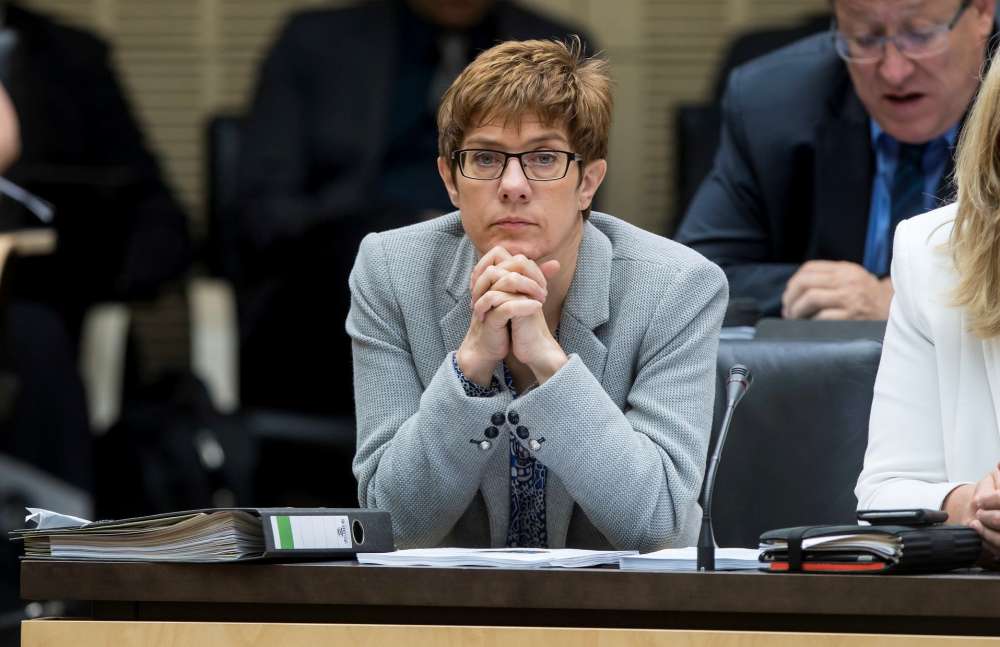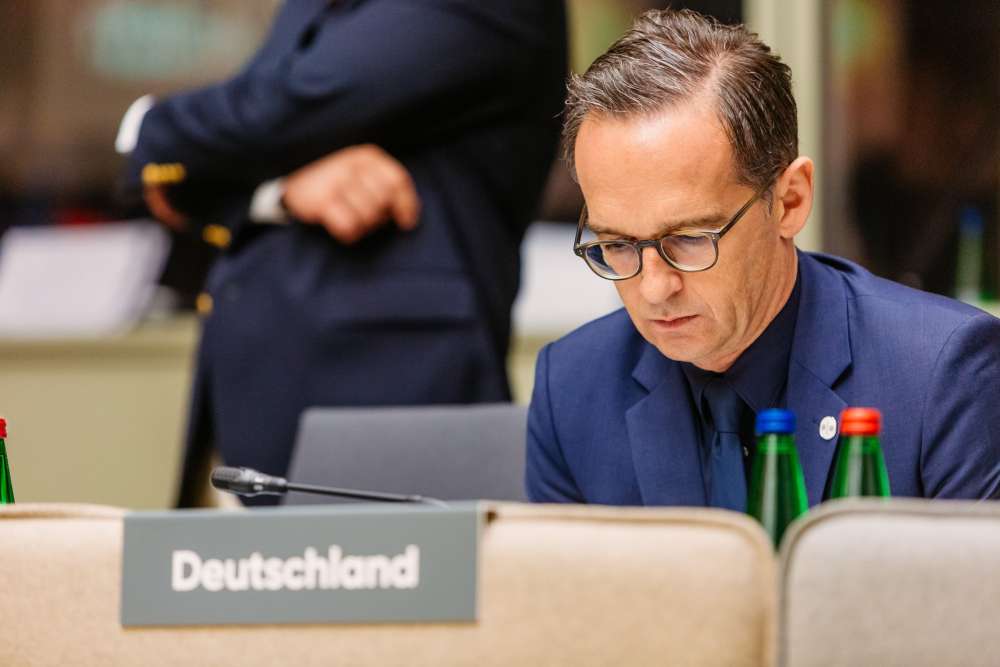The Path to a German National Security Council

The next German government will have to shape foreign and security policy more actively than ever before. To strengthen a European Union that can lean less on the US and that will only make progress if Berlin plays a more active role, Germany will have to develop more of its own ideas and strategies. To make this happen from the start, Germany’s next coalition agreement must agree on a more ambitious compromise on foreign and security policy than previous governments.
The list of challenges is long: a rapidly changing climate, a more aggressive Russia and an expanding China, global poverty, pandemics, forced migration, cybersecurity threats, just to name a few. Germany’s national security architecture is ill-equipped to tackle exactly these kind of problems that require inter-ministerial cooperation and where progress at the European level demands earlier and more strategic input from Berlin. To meet the challenge, a growing number of security experts are calling for adjustments to Germany’s national security architecture – namely in the form of something akin to a national security council. The chances that Germany will be able to form such a council are the best they have been in the last 20 years. To take advantage of this opportunity, all potential parties in Germany’s upcoming government must enter the coalition negotiations with clear ideas about what changes they are prepared to make and how a national security council should look.
An Old Idea
For years, there have been frequent calls for a national security council based within the German Chancellery: by Wolfgang Ischinger, who has been calling for one for nearly 20 years, most recently by a special report from the Munich Security Conference, by security policy expert Julie Smith (who is likely the next US ambassador to NATO), and in discussions on a more coherent peace and security policy on this blog (from authors like Franziska Brantner and Christian Thiels).
Several German politicians across party lines have also argued in favor of a national security council. Since 2008, members of Germany’s Christian Democrat Party’s (CDU/CSU) parliamentary group have repeatedly proposed upgrading the existing Federal Security Council (Bundessicherheitsrat) – a cabinet committee that almost exclusively deals with arms exports – to a national security council. In a 2016 resolution and a subsequent 2017 motion, the Green parliamentary group called for the establishment of a “National Council for Peace and Sustainability.” In November 2019, Germany’s Defense Minister Annegret Kramp-Karrenbauer made the attempt to revive the debate on a national security council in a speech at the Bundeswehr University of Munich. Shortly thereafter, in March 2020, the Bundestag debated the idea during a motion put forward by the parliamentary group of the Free Democratic Party (FDP).
“Institutions Do Not Create Interests” Is Not a Convincing Counter-Argument
Reactions to proposals for a national security council – in the German Bundestag or most recently in an April 2021 event at the German Council on Foreign Relations (DGAP) – show a range of opinions among the parties most likely to be involved in the next government, but the idea is gaining traction. While the FDP is committed to creating a national security council, the Social Democrat Party (SPD) appears to be completely opposed to its creation. On 19 May, CDU Chancellor candidate Armin Laschet called for the creation of a national security council by upgrading the existing Federal Security Council. And in early May, Green Chancellor candidate Annalena Baerbock indicated that she would favor more coordination on security policy from the Chancellery during a talk at the Federal Academy for Security Policy.
Political scientist Carlo Masala summed up the main argument on the side of the skeptics in the podcast Sicherheitshalber: “Institutions do not create interests.” The problem with crafting a coherent German security policy, he argued, is conflicts of interests between coalition partners – not the lack of a coordinating structure. Nils Schmid, the SPD parliamentary group’s foreign policy spokesman, echoed the same sentiment at the DGAP event in April: “If you have the political will, you do not need new structures.”
This argument misses the mark on three crucial points.
Talking Paves the Way for Common Ground
First, it ignores the fact that formal structures can help create commonality between politicians and ministries. When German Defense Minister Kramp-Karrenbauer proposed a national security council, former Foreign Minister Sigmar Gabriel argued: “In a coalition government, you have to persuade, not command.” That is true – but within the current German security architecture, this kind of persuasion rarely happens at all. In the same article, Gabriel called for the establishment of a European security council, arguing that, to encourage European cooperation on foreign policy, “all that is really needed is for the EU heads of state and governments to meet alongside the foreign and defense ministers every four weeks. Just forcing them to regularly confront different ways of looking at the world would be healthy progress.”
Exactly – and the same principle applies to German ministers. A regular meeting of the relevant ministers promises to improve cooperation not just at the highest level, but also at lower levels of each ministry. Even simply scheduling a regular meeting time to deal with foreign and security policy at the cabinet level would be a step in the right direction. Of course, this would not stop individual ministers from going it alone on contentious issues. However, regularly consulting and crafting strategy with their counterparts would make it less likely for any one minister to go rogue. Consistent meetings would also not eliminate all contradictions – for example, between trade, agriculture and development policy – or completely prevent the German government from abstaining in Brussels because of infighting within the coalition government. But it would increase the chances that these pressing contradictions would be debated in the first place.
Familiar and regular structures at the ministerial level would also be important for short-term crisis responses. For example, if the Russian troops stationed on the Ukrainian border in April had actually invaded, there would have been no set process for deciding which ministers should coordinate with which actors and when it should happen. “When this kind of thing happens, everyone starts making phone calls and sending text messages to each other,” said an experienced diplomat: “If you do not have a process in place for such scenarios, you are forced to rely on your allies to address them.”
The Status Quo Does Not Even Work For Undisputed Policy Issues
Second, the current national security architecture in Germany does not work even in situations where there are no conflicts of interest between coalition partners. Since 2015, the German government has published six Africa strategies – even though Germany’s foreign policy with African states is not a topic of contention between the CDU/CSU and the SPD, the parties that make up the current coalition government. Even beyond topics like arms exports or military spending, Berlin usually makes decisions on foreign and security policy with the same efficiency as it has on the Corona pandemic: too little, too late. Of course, there are coordination mechanisms in place – interdepartmental working groups, task forces, meetings of state secretaries, and more. However, instead of crafting practical compromises, these existing mechanisms negotiate truces. Thousands of hours of well-paid civil servants are wasted in disputes at the working level because politicians have not made a decision or do so too late. According to the recent Munich Security Conference report, what Germany lacks is, “both ‘transmission belts’ and a common institutional framework for integrated decision preparation, decision-making and implementation.”
There Is No Place for Formulating Political Strategies
Third, Germany’s current security structures leave little room for necessary strategy-making – a problem that is not limited to contentious issues. Over the past five years, Germany has debated the merits and shortcomings of the government’s guidelines on conflict prevention and stabilization and the development of several inter-departmental strategies, including on security sector reform and strengthening the rule of law. One of the most important findings from these discussions: All investments in the German government’s conflict prevention and stabilization instruments will remain unsuccessful at best – and counterproductive at worst – if they are not embedded in political strategies that support the countries in which they are deployed. But, at the moment, there is simply no set process for ministries to jointly develop or adapt political strategies for engaging in those states.
And conflict prevention is just one issue area – the same strategic deficit exists in other fields of German foreign and security policy. Germany’s China policy, for example, deals with fundamental issues of security, climate, trade, and technology – issues for which a number of different ministries have the lead. However, there is no set process discussing these different aspects, for weighing options and prioritizing policy goals in the long term. Instead of a process, there is an “endless succession of proposals, ad hoc decisions and momentary snapshots out of which, in the best case, a policy emerges,” as one interviewee described. This is not a forward-looking way to craft policy. And it results not only from different interests within the coalition, but also from a lack of coordination.
For all those reasons, the argument that, “if you only had the political will, you would not need new structures and processes,” falls short. Yes, there must be the political will to change Germany’s foreign and security policy into something that is more forward-looking, active and strategic. But actors who possess such political will would also create better structures to translate it into practical policy.
It’s Not Just a Question of Structures, But of Political Power
The fact that it has not been possible to reach an agreement on the establishment of a national security council in the middle of the previous legislative periods – for example, during the debate on Germany’s 2016 White Paper – is not surprising. Creating such a council is not simply a structural and bureaucratic question, but touches on central issues of political power, the definition of security and the extent to which coalition partners agree on foreign and security policy. If those issues are not part of the coalition negotiations at the start of the legislative period, they will not be resolved in the midst of governing.
For the upcoming coalition negotiations, it is also crucial to be aware that a structural decision alone does not make up for a lack of trust. In 1998, the German government formed between the Social Democrats and the Green Party was able to agree on the following sentence in the coalition agreement: “The new federal government will return the Federal Security Council to its originally intended role as an organ for coordinating German security policy and will create the necessary conditions for doing so.” However, when the government started working, then-Foreign Minister Joschka Fischer backpedaled on the plan. Afterward, the Federal Security Council received more attention, including in the media, but continued to focus almost exclusively on arms exports.
(Not) a Loss of Power for the German Foreign Office?
To avoid a similar dynamic, the future German coalition partners should be sure to factor in the expected and desired shifts in ministerial power into their negotiations. First and foremost, the power shifts will concern the relationship between the German Foreign Office and the Chancellery. Although the Foreign Office formally has the role of coordinating security policy, it lacks the power to do so authoritatively, as it operates on the same hierarchical level as the other ministries with which it works. The only place with the authority to effectively coordinate security policy is the German Chancellery. This is true not despite of, but rather because of the existence of the “Ressortprinzip” – the fact that, by law, German government ministries are afforded a high degree of autonomy to govern the issues under their purview.
Germany’s former Foreign Minister Gabriel expressed the traditional mistrust in the Foreign Office by saying: “In truth, with this proposal, the ‘strategists’ in the Defense Ministry have been hoping for years that a higher authority, meaning a national security advisor in the Chancellery, would help to take away power from the troublesome Foreign Ministry.” It is true that, in recent decades, the CDU/CSU simultaneously held both the Chancellery and the Defense Ministry. For that reason, the Defense Ministry could indeed hope that a Chancellery with a bigger role in security policy would provide it with more backing in case of any conflicts with the Foreign Office.
However, more prioritization, definition of interests and strategy formulation on foreign and security policy at the ministerial level and more coordination from the Chancellery do not necessarily equate to a loss of power for the German Foreign Office. For example, some policymakers in the United Kingdom’s Foreign Office felt as though their ministry had gained power after the introduction of a national security council under Prime Minister David Cameron in 2010. If joint decision-making in a national security council means that foreign and security policy is more often prioritized over, for example, economic, trade or agricultural policy, it would be the ministry that conducts foreign policy that ultimately gains power.
Moreover, Gabriel’s stance – and in the last debate around Kramp-Karrenbauer’s proposal, that of the SPD – implies an ‘all-or-nothing’ logic that simply does not exist. Creating the position of a national security advisor in the Chancellery with the power to constantly overrule ministers on contentious issues would only be one option – and the most radical version – for possible changes to Germany’s national security architecture. Indeed, this version is highly unrealistic, as it would be extremely difficult to reconcile with the Ressortprinzip and the nature of coalition governments. However, between this option and the status quo lies a whole range of other possibilities.
Further debate on a German national security council within party headquarters, parliamentary factions and civil society should at least consider the following aspects.
1. Upgrade the Existing Federal Security Council or Create an Alternative Structure?
A regular meeting of ministers to discuss security policy could be organized in at least two ways: One option would be to upgrade the existing Federal Security Council. The other alternative would be to create a new structure that ensures that the cabinet (or the relevant parts of the cabinet) meets regularly to discuss foreign and security policy issues, and that such meetings are prepared effectively.
Germany’s Federal Security Council is currently a cabinet committee that makes recommendations to the cabinet at large. It already has defined procedural protocols, a small secretariat in the Chancellery and a preparatory committee made up of department heads from selected ministries. What the Federal Security Council currently lacks is the authority to make binding decisions on issues beyond arms exports without approval by the full cabinet. Changing this would mean adapting the existing protocol, clarifying the degree of secrecy of the meetings and increasing the number of secretariat staff in order to adequately prepare the proceedings. The latter could be achieved, for example, by drawing on staff from all relevant ministries.
Those who object to the term ‘Federal Security Council’ could arrange for a regular cabinet meeting, in which only the relevant ministers would take part on an ad hoc basis. However, even this kind of meeting would require a secretariat of officials in the Chancellery and set protocols to plan and run the sessions effectively. In the end, this option would basically lead to an upgraded and renamed Federal Security Council.
2. Does Germany Need a National Security Advisor?
What would be the role of the coordinating position inside the German Chancellery? Would there be a national security advisor? The most radical option would be to create a national security advisor at the same level as the ministers (as Christian Thiels suggested on this blog in 2016) with the authority to make decisions on behalf of the Chancellor when disagreements arise between the ministries. In contrast, the smallest change would be to elevate the current Federal Security Council secretary’s role to the level of the Chancellor’s foreign policy advisor – at present, the head of Directorate-General 2 at the Chancellery – with the same powers as today. Neither would be a great solution: the former would be unrealistic in German coalition governments. The latter would not change anything.
An option in between these two extremes would be to upgrade the role of the Chancellor’s foreign policy advisor to the level of a state secretary or minister of state, and to consolidate several departments in the Chancellery under this position, including the current foreign and security policy Directorate-General 2 and the Directorate-General 7 for the intelligence services. Incidentally, this is not an entirely new proposition – in 1998, Frank-Walter Steinmeier was a state secretary positioned directly underneath the head of the Chancellery (the latter a cabinet minister) and responsible for supervising the intelligence services.
In order to prevent a concentration of power in the Chancellery that would be harmful to coalition politics, the smaller coalition partner – who usually leads the German Foreign Office – could choose the person that heads the coordinating secretariat at the Chancellery. Alternatively, the deputies for the national security advisor could come from the foreign, defense and development ministries, respectively. Erich Vad, former Security Policy Advisor to the Chancellor, considers both of these options conceivable.
3. How Is ‘Security’ Defined and Which Topics Should be Covered?
Which definition of ‘security’ would the council work with? Some think primarily of the military, intelligence services, police, and counterterrorism efforts, of improving cooperation between the police and the Verfassungsschutz (Office for the Protection of the Constitution) at the federal and state levels, and even of abolishing the rule that police work and Verfassungsschutz be strictly separated. Others define security as human security, which includes not only development and human rights policy, but also climate policy. How extensive should a national security council’s portfolio become? What, for example, is the council’s relationship to policy decisions on Europe, which cut across all other policy areas? How many ministries need to be involved? Another substantive question: how much time will be reserved for foresight, crisis prevention and long-term strategy building, and how much time for responding to acute crisis situations?
4. Who Should Draft the Strategy Documents?
Related to these questions are further considerations about the extent of the compromises on foreign and security policy by the future coalition partners. No matter what the cabinet committee is called, greater integration would make it more difficult for some ministers to blame foreign policy decisions on other coalition partners. Can the coalition agree on a joint national (peace and) security strategy, which is already long overdue, to replace the existing white paper and guidelines on conflict prevention and stabilization? And should it be the responsibility of the council’s secretariat in the Chancellery to develop such a document, as was the case in Japan?
5. Who Sets the Agenda?
If a national security council gets off the ground in Germany, who will develop the agenda and write the minutes? These questions also have implications for the power dynamics between the Chancellery, the Foreign Office and other German ministries. For example, a 2020 special report by the Munich Security Conference suggested that different subcommittees could be led by the ministries relevant to the topics.
And where should the council’s situation analyses originate? Since November 2019, a situation center in Division 041 of the German Foreign Office has been producing daily analyses of developments on foreign and security policy issues. The center also involves Germany’s Defense Ministry, Interior Ministry and the Foreign Intelligence Service (BND). What role could this center play in a future security architecture? Christina Moritz, who has worked for both the CDU parliamentary group and the Ministry of Defense, suggested that the analysis and evaluation of “all available civilian and military sources for the preparation of the meetings” should come from the Ministry of Defense. For those who define security policy a little more broadly, this solution will not sound very appealing.
6. Should Germany Amend Its Basic Law?
Another question for the preparation of political parties for a national security council is whether – and in what form – an amendment to Germany’s Basic Law is needed. If, as a result of a national security council, ministers ultimately agree more often and the chancellor more frequently exercise their authority when disputes arise, the Ressortprinzip would remain intact. If, however, the council’s work would change the division of labor between the federal and state governments or the strict separation of police and intelligence services, this could result in necessary amendments to the Basic Law.
Do Not Let Perfect Be the Enemy of Good
Political parties are not the only ones who need to think through these questions: it is important that civil society and security experts – many of whom have been authors and readers of this blog over the past five years – also engage with the debate on a national security council. If there is to be any political pressure in favor of creating a coordinating body on security policy in Germany, it can only come from the public.
The issue is too bureaucratic to be politically relevant in the next election campaign. At the same time, changing Germany’s national security architecture is so highly political that it cannot be solved by bureaucracies alone. Any changes as described above will undoubtedly come with costs and drawbacks. But to be worthwhile, new security structures do not need to be perfect – they just need to be better.
This commentary was initially published on the PeaceLab Blog on May 20, 2021. An original German version was published on May 6, 2021.







